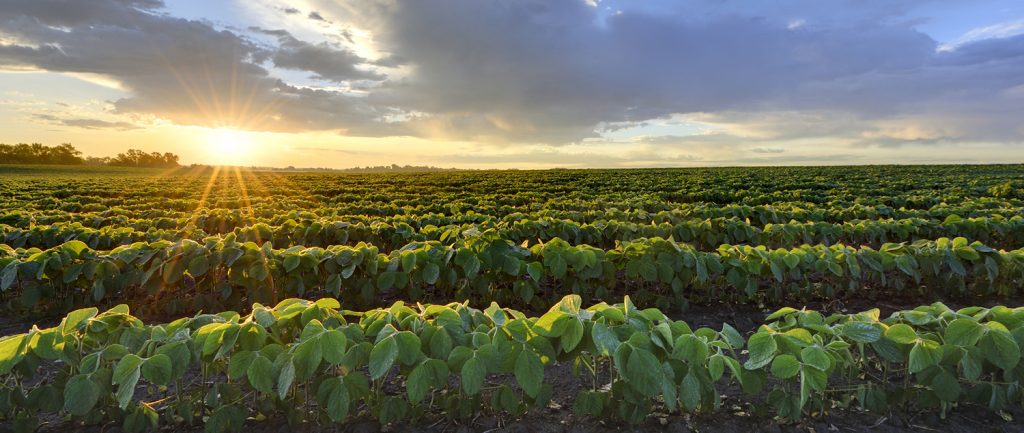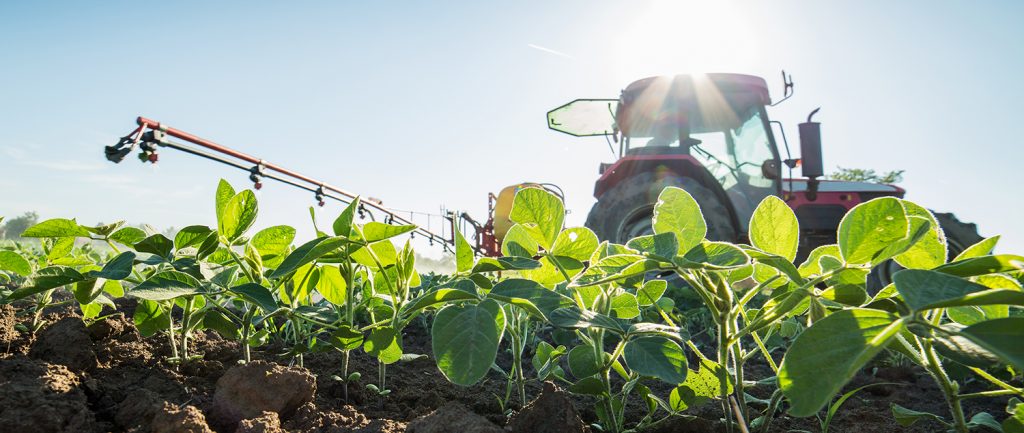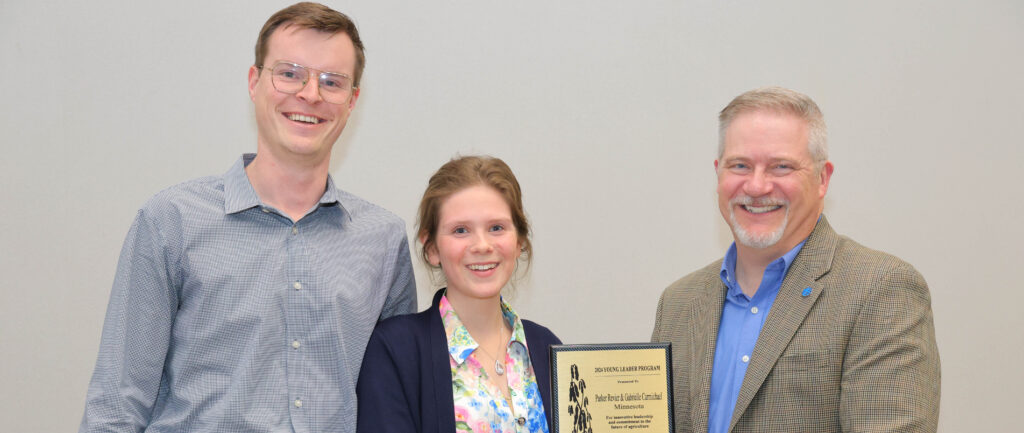Family at the heart of farming operation
The late Martin Luther King, Jr. once said: “Faith is taking the first step even when you don’t see the whole staircase.”
When Fairmont, Minn., farmer Lawrence Sukalski started his own farming operation in 1978 with 17 acres, there was no way that he could have seen the top of the staircase, or rather, the operation he would one day run.
What he could see was the support of his wife and his brother, Harlan, both of whom helped him branch out and grow their corn and soybean operation along the Minnesota-Iowa border.
“There were a lot of nights we slept with a cement pillow. The ’80s were tough,” Sukalski says. “But in the end you just try to do as well as you can and hope you’re successful and if you aren’t successful, at least you know you tried and did everything you could.
Help away from the farm
For the first years of his operation, Lawrence worked a full-time factory job in Fairmont making railroad maintenance equipment. The job allowed him to earn a steady wage while learning more about business.

Sukalski admits the 1980s were tough on farmers, and knows many people lost their operations. For some farmers, that meant an opportunity to expand, something he was fortunate enough to do.
“It was the equity I made in the job in town that allowed us to expand,” he says. “At one time, 54 percent of the acres we were farming came because others had to give it up because of hardship. The hard times created opportunities for some.”
He and his wife, Diane, also made other sacrifices, one of which carried long past the ’80s.
“You realize how difficult the ’80s were,” he said. “But we had a pretty nice place to live and we were renters for 28 years, and that was difficult. Diane didn’t necessarily like that. She wanted her own house. Not that renting is a hardship, but we bought land and equipment instead of a house.”
Fortunately, Lawrence says, Diane understood the need to pour resources into the farming operation. Her parents, George and Ruth Johnson, provided strong family farm values on their farm in neighboring East Chain Township.
As he watches his three sons and two daughters pitch in and help out on the farm despite each having full-time jobs, he can’t help but notice some similarities between his start that ventured through the ’80s and their start during a tough time with falling commodity prices.
“A good job in town is really like farming several hundred acres with a lot less effort and you don’t need all the machinery,” he says. “It’s a valuable thing right now.”
The future joins the present
Roughly 400 miles away, as the crow flies, Adam Aakre returned to his Kittson County roots near the Canadian border. Fresh off successful full-time jobs, he and his wife, Shawna, and son, Landon, took advantage of the opportunity to farm near Adam’s father, Kurt. The pair had bought land early in their marriage and took the opportunity to rent more in 2016.
“When we sat down with my family to discuss our potential move to full-time farming, we had to say what we thought we would bring to the operation personally, professionally and financially,” Adam Aakre says. “So, other than being manual labor, we had to show that we were invested into the future of the farm long-term.”
The duo had saved up enough money in their full-time gigs to buy a little land, and a neighbor had some land they were able to rent.
Adam credits the knowledge they gained in their jobs and in college as playing a big role in their ability to shift to the farm and make meaningful contributions. Shawna says it’s more than just that. The two come from strong farm families and share a strong faith.
“We have felt really honored that God blessed us with such an opportunity to do what we love, as we know people who would like to farm but do not have the resources or opportunity to begin,” she says. “We’ve also experienced uncertainty since there is no regular income. But we know this is a lifetime choice for us, so it is very special and meaningful, and we are at peace with the timing of it.”
Family farm
Lawrence and Diane Sukalski raised five children while growing their farming operation with Harlan Sukalski. Lawrence, always the positive role model for his children, knew that above all

else, his children’s future came above the needs of the farm.
“Around the farm there are always responsibilities and things that need to get done but when the children came home from school, I didn’t have any of their time until their homework was done,” he says. “Sometimes I didn’t see them that night out in the field or out in the yard. That was the one thing that never changed. They always came home with their papers, and Diane went through it with them and the homework was done before they went outside.”
Diane says that the children were responsible for other reasons than just her perseverance with their homework.
The Sukalski’s youngest child, Suzy, was born with Down Syndrome.
“I think the kids all matured quicker because of the responsibilities they took on for her care and education,” she says. “They realized they had their abilities. They had that extra gift to be thankful for. With Suzy we focused on her abilities, not her disabilities. That has gotten her farther, too.”
Diane says every family member is heavily involved in a wide variety of community service activities, possibly as a result of their deep gratitude for the services Suzy has received.
Lawrence says their role with Suzy definitely helped them mature, but he credits his children’s success and his farming success to Diane’s dedication to family.
“Managing that end of it and keeping them successful and their heads clear and out of trouble made it a lot easier for me to spend more time concentrating on the farm,” he says.
For Kurt Aakre, who wrapped his first year farming full time with his son, Adam, the future is bright.
“The transition of them coming back to farm has been incredible because of their overall knowledge of our farming operation,” he says. “I feel proud watching Adam and Shawna share this passion and choosing to farm.”
For Adam, being with his father and uncle while growing a tradition with his son, Landon, motivates him.
“Being a father gives me more energy to want to be able to pass on the family farm,” he says. “I want to keep it successful so that future generations can keep farming. I have been proud when Landon wants to be out in the field or in the tractor with us and is intently studying everything we do. He always changes his attitude when he is crying or fussy to being super happy whenever he gets to be outside, especially when he gets to be around farm equipment that is running.”
Trusting in a higher power
During those lean years in the ’80s, Diane says she drew strength from Lawrence’s faith in God, and his positive attitude.
“Lawrence, if we were having a tough time, he didn’t voice those concerns,” she says. “He didn’t want anybody else to have that stress, so I never thought we were having difficulty. We have always been conservative with resources and money, so Lawrence didn’t have to tell me to cut back. We just kept our nose to the grindstone and kept moving forward. That’s all you can do and try to find the positive in every day.”
Lawrence says his parents instilled values in him that he trusts to this day.

“They raised nine children on 140 acres,” he says. “They taught us how to pray and they taught us how to work.”
Shawna Aakre, who aside from leaving her full-time job to join Adam on the farm, moved five hours away from her own family and their farming operation. Though the distance is cumbersome, the lessons her parents taught her are proving useful.
“We have been given wisdom in how to organize our finances and book work, stay strong as a family through joys and stresses, trust that God has a plan and put in our best if we are going to expect to continue our farm successfully,” she says.
Kurt Aakre has a similar hope for his son, daughter-in-law and grandson.
“Our farm has been in operation for nearly 125 years,” he says. “My prayer for Adam and Shawna is as they encounter both successes and challenges, they will know that their faith in God will see them through.”
He also relishes in his own enjoyments of having them on the farm.
“The opportunity to pass on the farm to the next generation is a blessing,” he says. “I am excited to have my grandchildren ride with me in the “buddy seat” for years to come.”
For Sukalski, he’s confident his children are on the right track.
“What I see them doing more than anything is doing research and looking at opportunities and asking what should we do? Should we sell? Should we hang on? Should we look at doing something different?”
His parting wisdom for when times get tough is simple:
“Things turn out for the best when we make the best of the way things turn out.”
Diane prefers to defer to the wisdom of musician Steven Wilson:
“Your best harvest may be the pleasure you get from working with family and friends. There’s never a shortage of things to do, no limit to the lessons that can be learned, especially for children, and there’s always plenty of credit to go around, even for the mistakes.”
Tags: family farming




